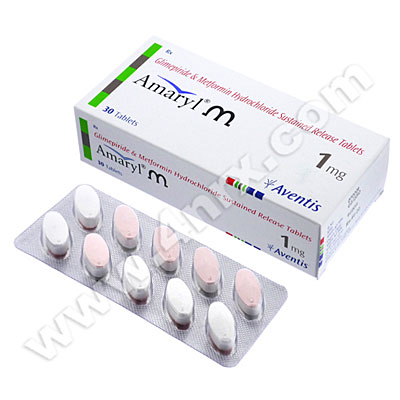 |
Home  Diabetes Diabetes  Amaryl M (Glimepiride/Metformin HCL) Amaryl M (Glimepiride/Metformin HCL) |
|
|||||||||
|
Amaryl M (Glimepiride/Metformin HCL)
What is Amaryl M (Glimepiride/Metformin HCL) used for? Amaryl M (Glimepiride/Metformin HCL) is given to patients to help treat type 2 diabetes. This drug contains two active ingredients, glimepiride and metformin. These two ingredients work together to control type 2 diabetes. Glimepiride works by causing the pancreas to produce more insulin, thereby helping to lower blood sugbar. Metformin works by reducing the amount of glucose the body absorbs from food, and increasing the body's response to insulin. This drug is not suitable for treating type 1 diabetes. How should I use Amaryl M (Glimepiride/Metformin HCL)? Amaryl M (Glimepiride/Metformin HCL) comes in the form of tablets which are taken orally, usually once per day, with breakfast or the first meal of the day. Patients should consult their physician prior to the commencement of treatment so that the correct dosage can be prescribed, and should never exceed the dosage prescribed. What are the side effects of Amaryl M (Glimepiride/Metformin HCL)? Patients may experience some side effects when taking Amaryl M (Glimepiride/Metformin HCL), such as:
Patients should immediately consult their physician if they experience any other more serious side effects, such as loss of breath, dark colored urine, a pain in the upper stomach, yellowing of the eyes or skin, pain in the muscles, hallucinations or fever. Please Note Strictly follow all instructions provided to you by your physician or pharmacist while using Amaryl M (Glimepiride/Metformin HCL). Optimum and safe dosage can differ based on the patient and the condition being treated. As this medication may be unsafe for certain patients, it is essential you always inform your physician if you are pregnant or breastfeeding, as well as if you have any allergies, other illnesses, or ongoing health conditions, and if you are taking any other form of medication, supplements, or herbal products. Immediately seek emergency medical care if you have any allergic or hypersensitive reaction. Common signs of a reaction include hives, swelling, skin rashes, chest pains, as well as trouble breathing or swallowing. 

|
|||||||||||||||||